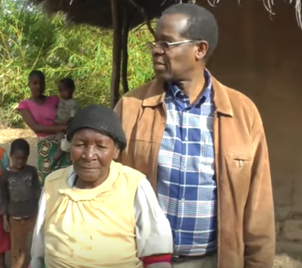|
It’s too impersonal. It shows a lack of care. We Africans take care of our relatives when they're old as gratitude for them taking care of us in our youth. Oh, how I used to be naïve.  I used to tell my English friends that we don’t need old age homes in Malawi because we take care of our old people within the family. This is certainly not universal; hundreds of old people in Malawi are completely destitute with no one to support them except the odd well-wisher. With almost 90% of the population living on less than $3 a day, their own children are not in a position to care for them in any significant way. Indeed, many people aged over 80 have seen their own kids die young and the one or two kids they are left with can’t even feed themselves. Overpopulation is another issue here. Having too many children means that you can’t afford to educate them all so they’re bound to end up poor themselves. Our own cook is now 61. He’s still fit but he has 10 children the youngest is only 6. We used to talk about him having to many kids 15 years ago when he had 7 or 8 already but such is his myopia and poor judgment that he went on to have more. He says his two oldest children have left home but they are constantly coming to him to ask for money because they quite literally have nothing to eat. In 10 or 15 years time he’ll be too old to work and will probably retire to the village despite the fact that there’s nothing for him there. So, how could we solve this issue. What format could old age homes take in Malawi? Can the government even afford it? The government is currently paying for lots of things it can’t afford so let’s suppose that it could rejig things to prioritize old people. For instance, we could reduce the free goods being given to working age people to direct more towards the old. Most people would be too embarrassed to take their old to a home so we’d need a structure that would allow the old to submit themselves. Local clinics could be extended to include “wards” for people aged 80 or 85+. This would allow the very old to stay within the community they are familiar with. These places don’t have to be lush: a wooden bed, plastic mattresses, basic blankets and three square meals a day. Cleaners would ensure the accommodations were clean and those that were too old to bath themselves received the necessary support to wash themselves and keep infections at bay. In the video above you see aFelegesi the old woman with one arm sleeps on the floor without a mattress in a mud hut with a leaking roof. With no one to help her she has to cook for herself on an outdoor fire. What kind of life is that? The model I propose is simple and inexpensive. We Africans like to think of ourselves as having strong community links and compared to the West we do but it’s not enough to prevent this degrading old age poverty.
7 Comments
|
By Heather
|
Heather Katsonga-Woodward, a massive personal finance fanatic.
** All views expressed are my own and not those of any employer, past or present. ** Please get professional advice before re-arranging your personal finances.
 RSS Feed
RSS Feed


